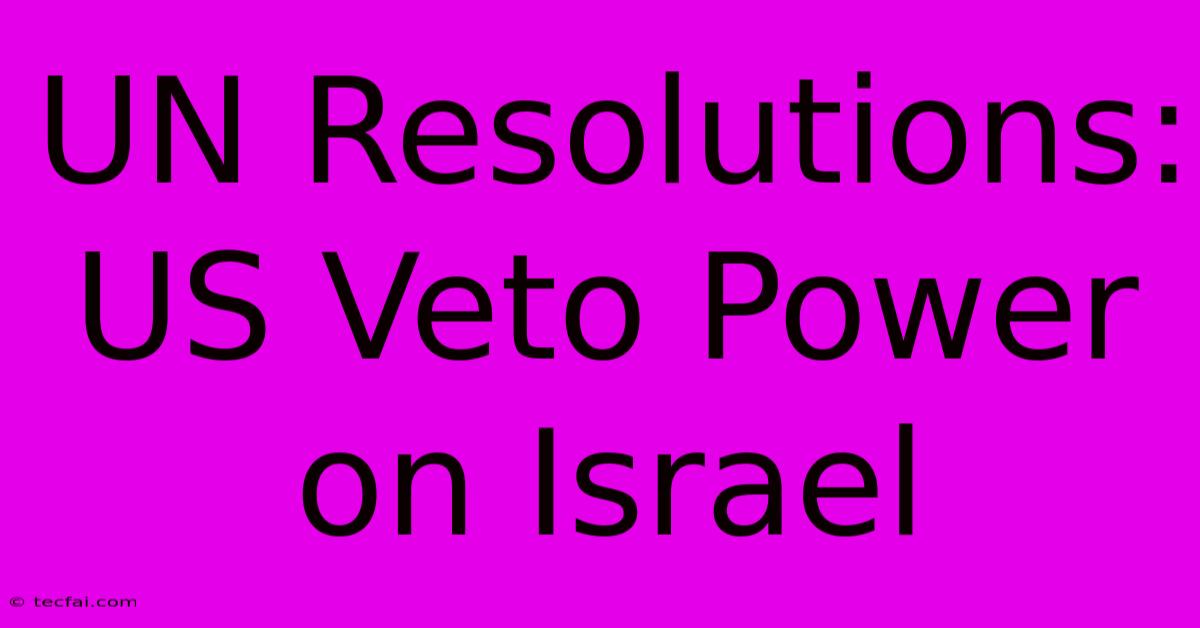UN Resolutions: US Veto Power On Israel

Discover more detailed and exciting information on our website. Click the link below to start your adventure: Visit Best Website tecfai.com. Don't miss out!
Table of Contents
UN Resolutions: US Veto Power on Israel – A Complex History
The relationship between the United States, the United Nations, and Israel is a consistently complex and often contentious one. A significant element of this complexity lies in the US’s use of its veto power in the UN Security Council regarding resolutions critical of Israel. This article will explore the history, the justifications, and the criticisms surrounding this practice.
The Mechanics of the Veto
The UN Security Council holds the primary responsibility for maintaining international peace and security. Its five permanent members – the US, UK, France, Russia, and China – each possess veto power, meaning any one of them can block a resolution, even if the other fourteen members approve it. This power was intended to prevent the Council from being dominated by a single nation or bloc, but it has also become a source of considerable friction, particularly in the context of the Israeli-Palestinian conflict.
The US and Israel: A Strategic Partnership
The US-Israel relationship is a cornerstone of US foreign policy. This strategic partnership is rooted in shared democratic values, security interests, and economic ties. The US consistently provides significant military and economic aid to Israel, reflecting this strong alliance. This close relationship significantly influences the US’s voting patterns within the UN Security Council.
US Veto Usage on Israel-Related Resolutions
The US has exercised its veto power numerous times on resolutions that are perceived as critical of Israel. These resolutions frequently concern Israeli settlements in the occupied Palestinian territories, the blockade of Gaza, or the handling of conflicts in the region. While the US often justifies its vetoes based on its assessment of the resolution's fairness and potential negative impact on peace negotiations, critics argue these vetoes hinder the UN’s ability to address human rights violations and promote a just resolution to the conflict.
Justifications for Veto Power
The US typically defends its vetoes by asserting the following:
- Protecting Israel's Security: The US often argues that certain resolutions unfairly target Israel and could jeopardize its security.
- Undermining Peace Negotiations: Vetoes are sometimes justified on the grounds that a resolution could derail ongoing peace negotiations or exacerbate tensions in the region.
- Procedural Objections: On occasion, the US may veto resolutions due to procedural issues or concerns about the resolution's language and enforceability.
These justifications, however, are frequently challenged.
Criticisms of US Veto Power
The US's frequent use of the veto on Israel-related resolutions has drawn substantial criticism from various quarters:
- Bias and Double Standards: Critics argue the US demonstrates a double standard, applying a different level of scrutiny to actions taken by Israel compared to those of other nations.
- Impeding Accountability: The veto prevents the UN from holding Israel accountable for actions that may violate international law or human rights.
- Undermining UN Credibility: The consistent use of the veto weakens the UN's authority and undermines its credibility as an impartial arbiter of international disputes.
- Entrenching the Status Quo: Critics argue the veto helps to maintain the existing, often unequal, status quo in the Israeli-Palestinian conflict.
The Path Forward
The debate surrounding the US veto power on Israel-related resolutions is unlikely to disappear anytime soon. Finding a path forward requires a nuanced understanding of the complexities involved. This includes acknowledging the legitimate security concerns of Israel while simultaneously addressing the need for accountability and upholding international law. Open dialogue, compromise, and a commitment to a just and lasting peace are essential to navigate this multifaceted challenge. Further discussion on the role of international law, human rights, and the principles of impartiality within the UN system is crucial for fostering a more equitable and effective approach to resolving the Israeli-Palestinian conflict.

Thank you for visiting our website wich cover about UN Resolutions: US Veto Power On Israel. We hope the information provided has been useful to you. Feel free to contact us if you have any questions or need further assistance. See you next time and dont miss to bookmark.
Featured Posts
-
Nation Supports Assisted Dying Poll
Nov 26, 2024
-
Cargo Plane Crash Vilnius Airport
Nov 26, 2024
-
Flu Risk Factors New Cdc Report
Nov 26, 2024
-
Ladbroke Grove Shooting Suspect Held
Nov 26, 2024
-
Microsofts Reaction To Recent Outage
Nov 26, 2024
